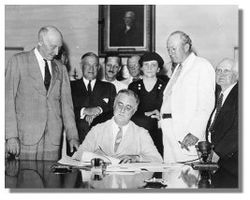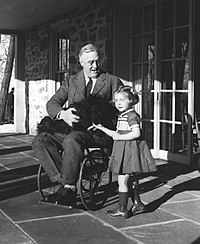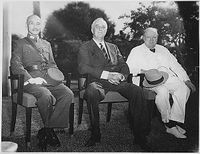Uncyclopedia:Imperial Colonization/project
FDR (pronounced like DDR, except he couldn't dance because he had polio) | |
|---|---|
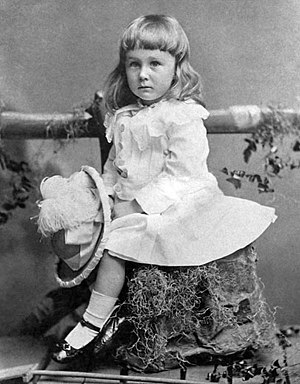 | |
| 32nd President of the United States | |
| In office March 4, 1933–April 12, 1945 (Dates almost as irregular as his walk) | |
| Vice President | Three different dudes, mostly to help him get up the stairs. |
| Preceded by | The vacuum guy. |
| Succeeded by | The guy who imprisoned Jim Carrey in that one movie. |
| Personal details | |
| Born |
|
| Died |
|
| Political party | Democratic Party |
| Spouse | She had a thing for girls and cripples. (1905-1945) |
| Children | Six, so that limb still worked. |
| Alma mater | Harvard Law School |
| Signature | |
Franklin D. Roosevelt (/ˈroʊzəvəlt/, his own pronunciation and who argues with a disabled guy?) (January 30, 1882 – April 12, 1945), was
and the 32nd President of the United States to frequently insert his D. into things where it wasn't necessary.
The wonky legged bastard even managed to inspire the Allies to victory over the Axis. What a little trooper.
Personal life[edit source]
Early life and education[edit source]
"Delano" (as he was nicknamed for reasons too obscene to be explained here) developed a love of the motorcoach. While driving it to his Aunt Bertha's house, the young future president flipped his wheels and caught whooping cough before hitting the ground. He was killed instantly, making him the first president to die before being elected. However, he would be confined to a wheelchair for the remainder of his life, and would even be buried in it.
Marriage and affairs[edit source]
Early political career[edit source]
State senator and Tammany antagonist[edit source]
[edit source]
Campaign for Vice President[edit source]
Polio[edit source]
Governor of New York, 1929–1932[edit source]
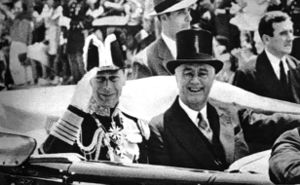
Upon his election as Governor of New York, Roosevelt is rumored to have said, "Betty, if I knew where I had it last, it wouldn't be lost! Please help me find it!" It is not known to what he was referring.
1932 presidential election[edit source]
In the election of 1932, Roosevelt was literally elected in a landslide when Republican incumbent Herbert Hoover, his only opponent, was crushed to death by cascading rocks.
The romance of FDR has become a captivating story portrayed in biographies and numerous A&E specials. Faced with depression-hit America during the mid-30's, the President was faced with a need to pacify the growing anxiety amongst the populous. While the creation of labor groups and employment agencies were recommended, Roosevelt took an unexpected, completely irrational approach and left his wife of 24 years, saying in a famous defense, "There is nothing to fear except commitment... and spiders... and the dark." The words, albeit nonsensical, stuck with the public, later the motto amongst dead-beat dads everywhere.
Presidency, 1933–1945[edit source]
First term, 1933–1937[edit source]
First New Deal, 1933–1934[edit source]
Second New Deal, 1935–1936[edit source]
Economic environment[edit source]
Foreign policy, 1933–37[edit source]
Landslide re-election, 1936[edit source]
Second term, 1937–1941[edit source]
Foreign policy, 1937–1941[edit source]
Election of 1940[edit source]
Third term, 1941–1945[edit source]
Policies[edit source]
Pearl Harbor and declarations of war[edit source]
The United States did not wish to enter the war. President Roosevelt promised that they would not enter the war, but the promise could not be kept. Ironically, this isn't the only time we've been lied to by presidents.
The Japanese had different thoughts as well. It was following acts and practices that led the United States in attempted isolationism that really pushed the Japanese buttons.
On December 7, the time was nigh for an attack and the Japanese brutally destroyed Pearl Harbor. The real break was when the USS Arizona was sunk by a Japanese strike. It was time for war.
Four Freedoms speech[edit source]
War plans[edit source]
Reference Manhattan Engineering District#The Manhattan Project?
Internment of Germans, Japanese and Italians[edit source]
War strategy[edit source]
Post-war planning[edit source]
Declining health[edit source]
Election of 1944[edit source]
Fourth term and death, 1945[edit source]
Last days, death and memorial[edit source]
Supreme Court appointments 1933–1945[edit source]
Civil rights[edit source]
Legacy[edit source]
Portraits[edit source]
Photos[edit source]
Age 50, Man of the Year of TIME Magazine, 1932

